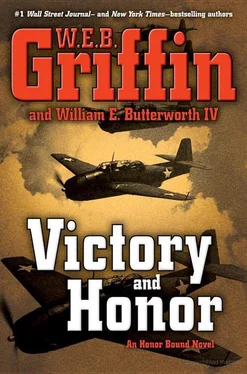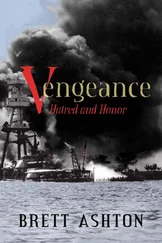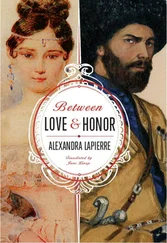W. E. B. Griffin and William E. Butterworth IV
Victory and honor
IN LOVING MEMORY OF
Colonel José Manuel Menéndez
Cavalry, Argentine Army, Retired.
He spent his life fighting Communism and Juan Domingo Perón.
There was little question by January 1945 that the Axis—Germany, Japan, and Italy—had lost the war. It was now just a matter of time.
In early 1942, just before the Japanese conquest of the Philippines was complete—the greatest defeat in American history—President Franklin Delano Roosevelt ordered the American commander in the Philippines, General Douglas MacArthur, to Australia.
On Corregidor Island, as MacArthur boarded a small patrol torpedo boat at a wharf in Manila Bay, he made the melodramatic promise to the Philippine people, “I shall return!”
On October 20, 1944, after he had waded ashore from one of the landing craft that had carried troops of the United States Sixth Army onto the beaches of Leyte, ignoring Japanese mortar and sniper fire, MacArthur melodramatically proclaimed, “I have returned!”
On January 17, 1945, Soviet troops forced the Germans out of Warsaw, and ten days later liberated the Auschwitz and Birkenau concentration camps, where they found the remains of more than a million people who had been murdered by the Germans.
On January 28, 1945, the Battle of the Bulge—Germany’s last-ditch attempt to turn the tide of war in Western Europe—failed. The Americans suffered some 75,000 casualties, the Germans nearly 100,000. The Americans easily recovered from their losses. The Germans had thrown just about all of their reserves into the fight and had no means of recovery. Most historians agree that after the Battle of the Bulge, the Germans had absolutely no hope of winning the war.
On April 12, 1945, Franklin Delano Roosevelt, the thirty-second President of the United States, died suddenly at Warm Springs, Georgia. With him at the time was his mistress, Lucy Mercer, his wife’s former social secretary.
Roosevelt was not quite four months into his fourth term as President. Vice President Harry S Truman—who had seen Roosevelt only twice since their inauguration; never for more than fifteen minutes, and he had never been alone with him during that time—was sworn in as the thirty-third president on the afternoon of Roosevelt’s death.
The next morning, Lieutenant General Leslie Groves, a U.S. Army Corps of Engineers officer in charge of something called the “Manhattan Project,” went to Truman in the Oval Office and said, “Mr. President, there is something you have to know.”
He then went on to tell President Truman what President Roosevelt had felt the former U.S. senator from Missouri should not know: The Manhattan Project had secretly developed a new superweapon, called the “atomic bomb,” and two of these devices were available for use.
On April 25, 1945, Major General Isaac Davis White’s “Hell on Wheels” Second Armored Division, with its bridges across the Elbe River, was prepared to take Berlin. Ordered to halt in place so as to permit the Red Army to take Berlin, White—a direct descendant of Isaac Davis, the man who fired “the shot heard around the world” at Concord Green, thus starting the American Revolution—was reported to be so angry that he kicked the windows out of his truck-mounted command post.
On April 28, 1945, Benito Mussolini and his mistress were captured by antifascist Italian partisans, executed, and then hung upside down from a light pole.
On April 30, 1945, as Soviet troops came close to the “Führer Bunker” in Berlin, Adolf Hitler and Eva Braun—his ex-mistress and bride of mere days—committed suicide. As soon as Dr. Josef Goebbels had seen that their bodies had been burned, the Nazi propaganda minister stood by as his wife fed cyanide capsules to their six children, and then she and he bit into their own capsules.
On May 2, 1945, Red Army troops completed the capture of Berlin and the last German troops in Italy surrendered.
On May 7, 1945, Germany surrendered unconditionally.
Hotel Britania Rua Rodrigues Sampaio 17 Lisbon, Portugal 3 May 1945
The younger man quickly stood when he saw the older man enter the restaurant and walk toward his table.
The older man was in his fifties, featured an ill-defined mustache and somewhat unkempt gray hair, and wore a black single-breasted garment with little or no padding in the shoulders—what members of his social class thought of as a “sack suit”—with a white button-down-collar shirt and bow tie.
He looked like a distinguished schoolteacher. Indeed, he always reminded the younger man of the Reverend Richard Cobbs Lacey, headmaster of Saint Mark’s of Texas, an Episcopal preparatory school in Dallas at which, a decade earlier at age fourteen, the younger man had had a brief—five-month—and ultimately disastrous association.
The younger man wore the somewhat splendiferous uniform of a South American Airways captain—SAA wings on a powder-blue tunic with four gold stripes on its cuffs and darker blue trousers with an inch-wide gold stripe down the hem.
Neither man was what he appeared to be.
The older one, whose name was Allen Welsh Dulles, was deputy director for Europe of the Office of Strategic Services. And the younger one, whose name was Cletus Howell Frade, was a Marine Corps Reserve lieutenant colonel detached for service in South America with the same U.S. spy organization.
They shook hands. Then Dulles motioned for Frade to sit, and found his seat.
A waiter appeared.
“A Johnnie Walker Black Label—a double, neat—for me,” Dulles ordered, and then asked, “Cletus?”
Frade shook his head. “I’m flying. Or at least I think I am.”
Dulles nodded, then looked at the waiter and said, “Just the one drink, please.”
The waiter left.
“So, how goes the war?” Frade said.
“In one sense, rather well,” Dulles began, then paused as he saw the waiter suddenly approaching with his drink.
When the waiter had left again, Dulles raised his glass in salute and solemnly said, “To victory in Europe.”
He took a sip and then went on in explanation: “Just before I left Bern to come here, I learned that German forces in the Netherlands, Denmark, and northwestern Germany will surrender tomorrow to Field Marshal Bernard Montgomery at Lüneburg Heath, just southeast of Hamburg.
“Grand Admiral Karl Dönitz, now head of the German state, has sent Admiral von Friedeburg, his successor as commander in chief of the German navy, to General Eisenhower’s headquarters in Reims to set up things. And Colonel-Generaloberst Alfred Jodl—the chief of staff of OKW, who will actually sign the surrender documents—is on his way to Reims as we speak.”
“And the other sense? What’s that? The reason you’re not in Reims?”
“I thought it more important—and so did Graham—that we had a talk before you went back to Argentina. The other sense, Clete, is that our war—Graham’s, mine, and yours—is just about to begin.”
Frade’s eyebrows went up when he heard his name rolled in with those of Dulles and Colonel Alejandro F. Graham, USMCR, the deputy director for the Western Hemisphere of the Office of Strategic Services. Both men were equals in the OSS, reporting directly to—and on occasion directly defying—OSS Director William “Wild Bill” Donovan.
“That sounds ominous,” Frade said. “Who are we going to fight?”
Читать дальше












